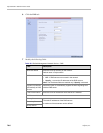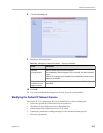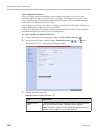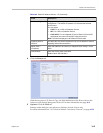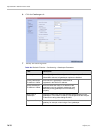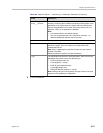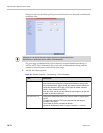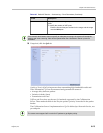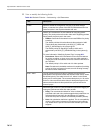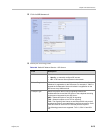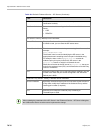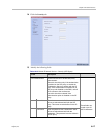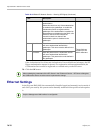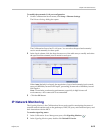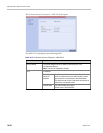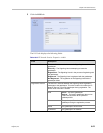
Polycom® RMX™ 1800 Administrator’s Guide
16-14 Polycom, Inc.
11 View or modify the following fields:
Table 16-8 Default IP Service – Conferencing – QoS Parameters
Field Description
Enable Select to enable the configuration and use of the QoS settings.
When un-checked, the values of the DSCP (Differentiated Services
Code Point) bits in the IP packet headers are zero.
Type DiffServ and Precedence are two methods for encoding packet
priority. The priority set here for audio video and IP Signaling packets
should match the priority set in the router.
• DiffServ: Select when the network router uses DiffServ for priority
encoding.
The default priorities for both audio and video packets is 0x88.
These values are determined by the QOS_IP_VIDEO and
QOS_IP_AUDIO flags in the system.cfg file.
The default priority for Signaling IP traffic is 0x00 and is
determined by the QOS_IP_SIGNALING flag in the system.cfg
file.
For more information "Modifying System Flags” on page 20-1.
• Precedence: Select when the network router uses Precedence
for priority encoding, or when you are not sure which method is
used by the router. Precedence should be combined with None in
the TOS field.
The default priority is 5 for audio and 4 for video packets.
Note: Precedence is the default mode as it is capable of providing
priority services to all types of routers, as well as being currently
the most common mechanism.
Audio / Video You can prioritize audio and video IP packets to ensure that all
participants in the conference hear and see each other clearly. Select
the desired priority. The scale is from 0 to 5, where 0 is the lowest
priority and 5 is the highest. The recommended priority is 4 for audio
and 4 for video to ensure that the delay for both packet types is the
same and that audio and video packets are synchronized and to
ensure lip sync.
TOS Select the type of Service (TOS) that defines optimization tagging for
routing the conferences audio and video packets.
• Delay: The recommended default for video conferencing;
prioritized audio and video packets tagged with this definition are
delivered with minimal delay (the throughput of IP packets
minimizes the queue sequence and the delay between packets).
• None: No optimization definition is applied. This is a compatibility
mode in which routing is based on Precedence priority settings
only. Select None if you do not know which standard your router
supports.



